
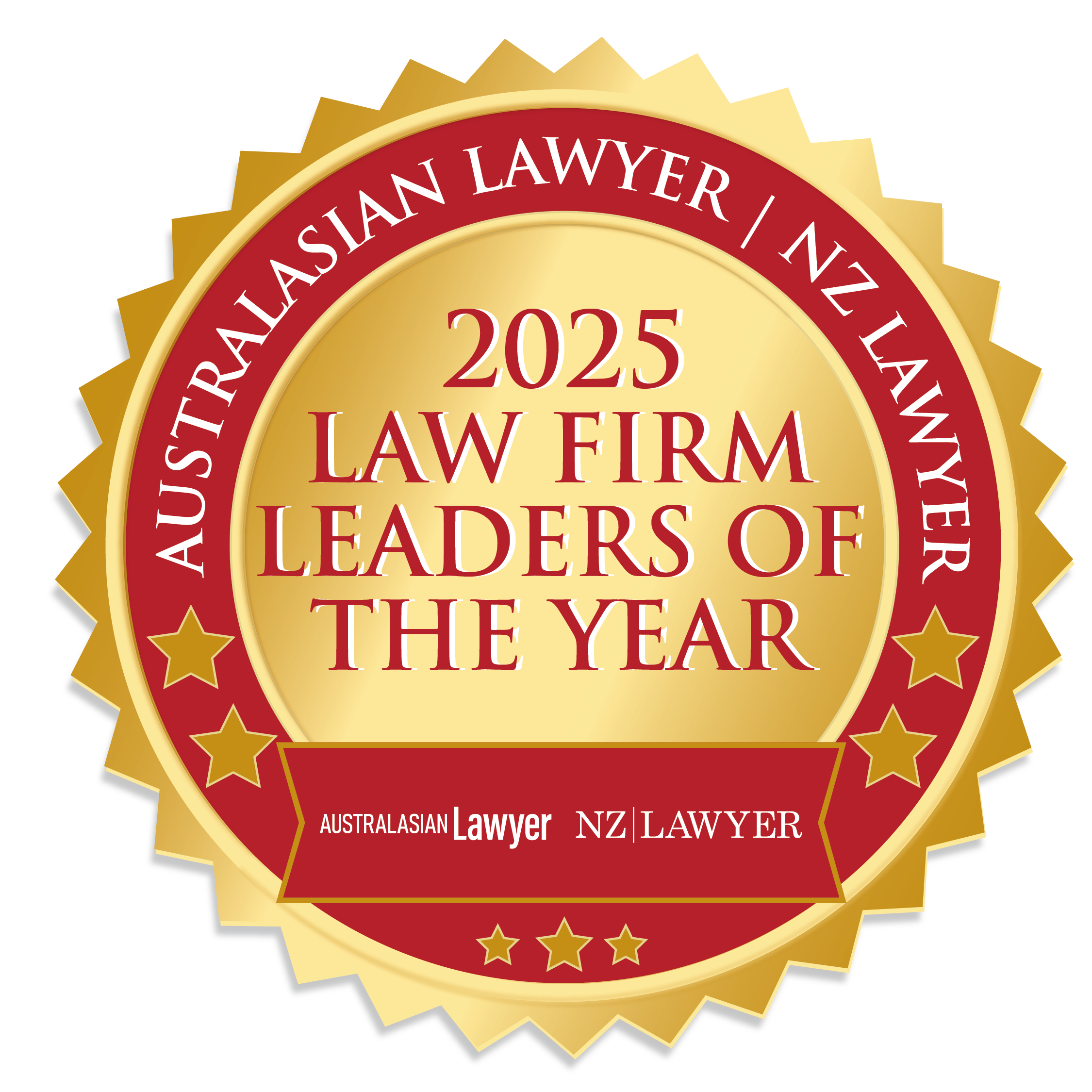
Jump to winners | Jump to methodology
Effective leadership is the key to how an industry and the firms within it perform.
That’s the measure of the Law Firm Leaders of the Year 2025, who have been recognised for pushing the boundaries, expanding their organisations’ revenue and empowering colleagues.
Australasian Lawyer and NZ Lawyer evaluated the most influential leaders in law’s performance over the past 18 months, emphasising exceptional leadership, strategic vision, problem-solving and legal expertise, client satisfaction and contributions to their firm’s success.
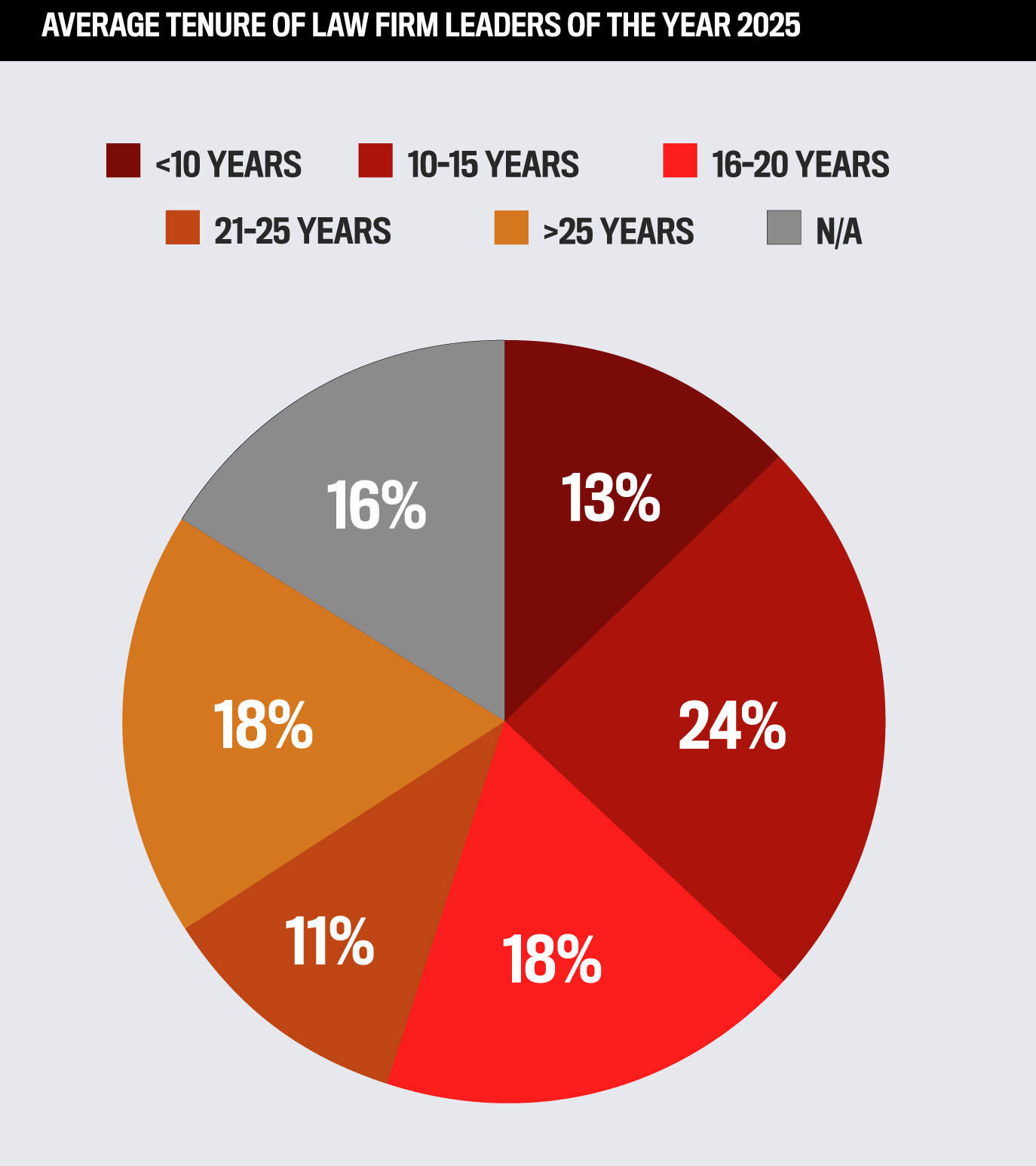
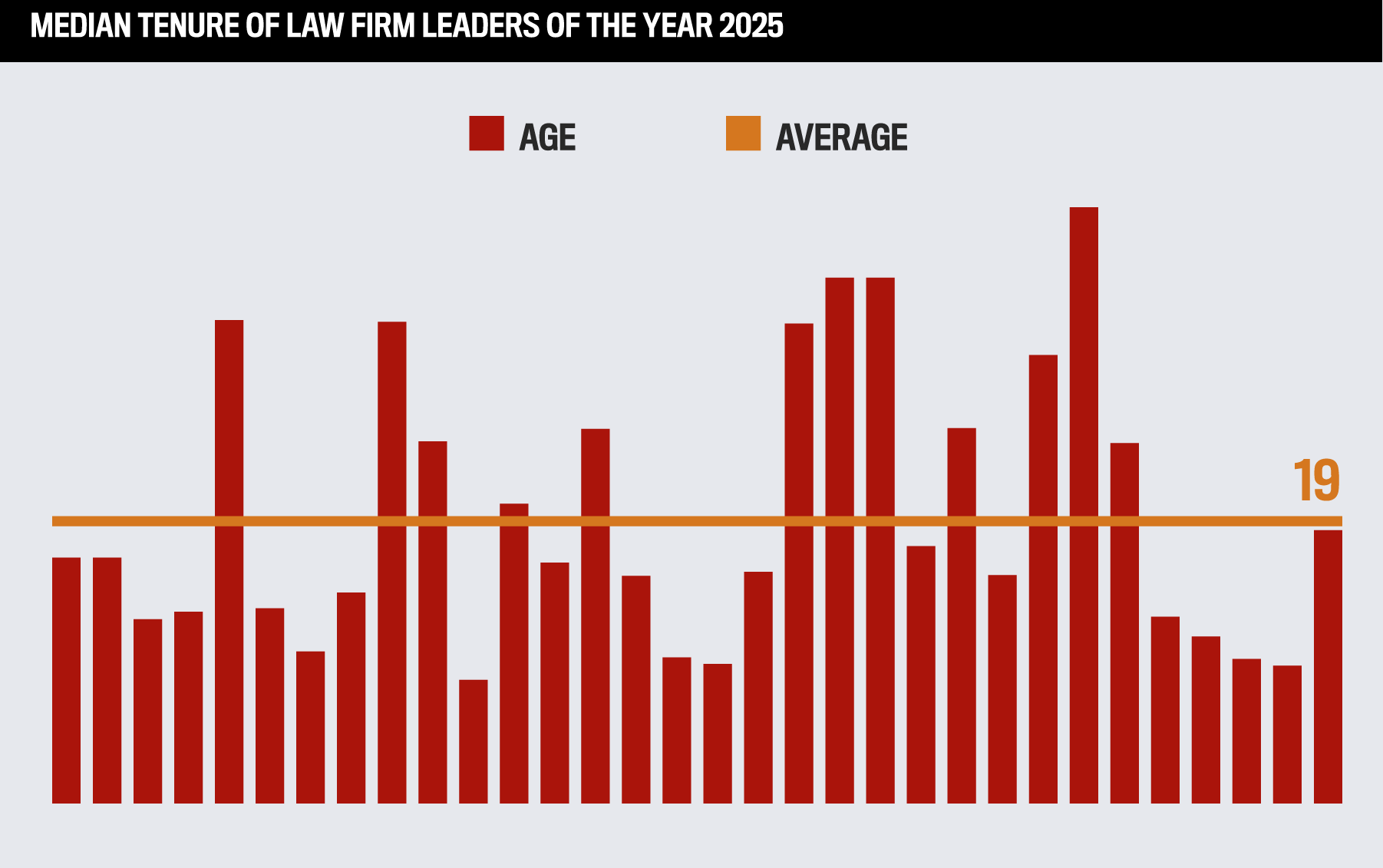
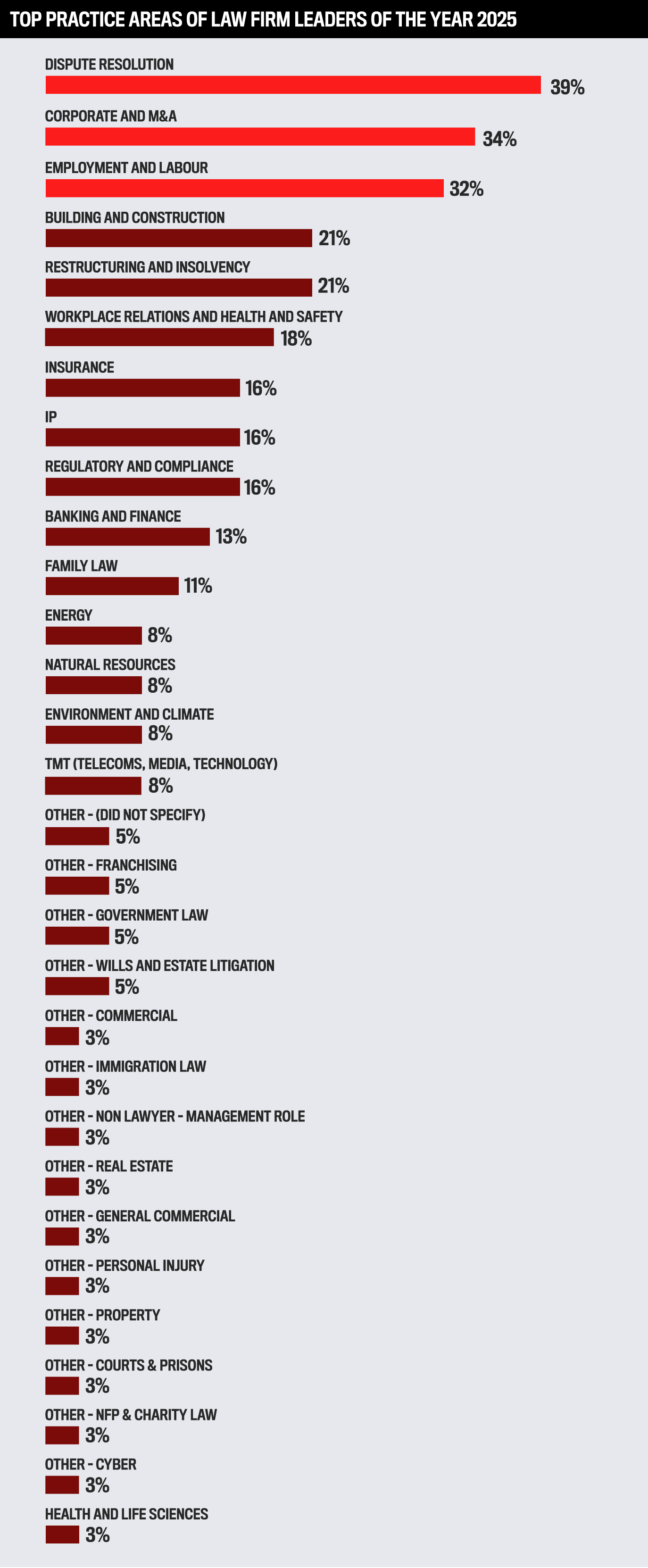
Across FY 2024, demand for legal services across the practice spectrum rose by 7.5%, while the average firm increased total profit by 19.0%, according to Thomson Reuters’ State of the Legal Market.
This was in conjunction with a 5.3% rise in headcount at firms, mainly across experienced lawyers, as firms responded to the uptick in demand.
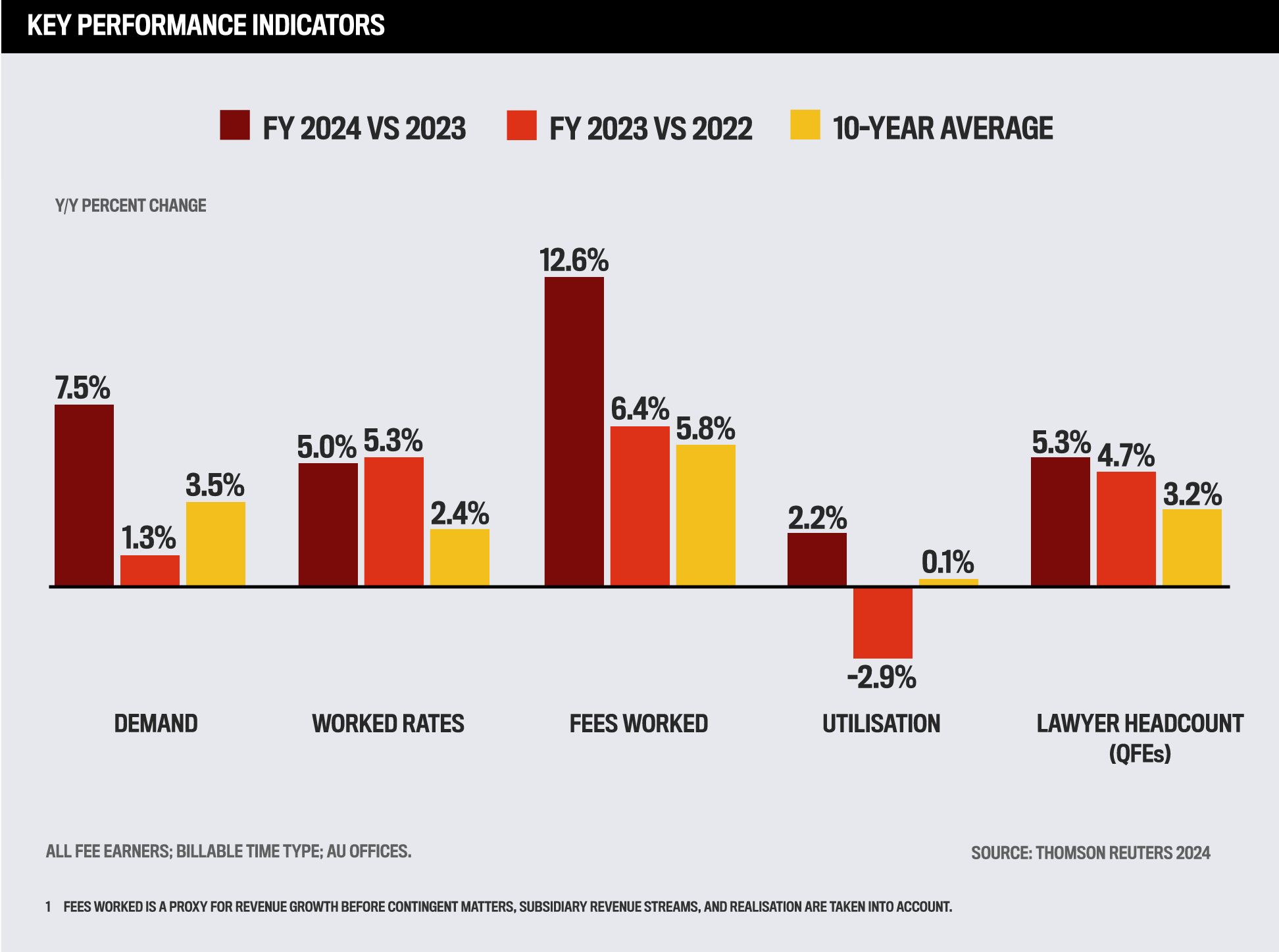
While stewarding their respective firms through an upsurge in demand, Australia’s influential law leaders have had to navigate a series of challenges.
The 2024 State of Cyber Security in Law Report research undertaken by ASX-listed cyber security and sovereign cloud provider AUCyber, in partnership with LexVeritas and in association with the Australasian Legal Practice Management Association (ALPMA) revealed firms’ biggest concern is cyber security.
The report stated, “Given the rise of sophisticated cyberattacks and data breaches, it is clear Australian law firms are highly aware of the need to strengthen their digital defences and prioritise cybersecurity. Protecting sensitive client data and matter information while ensuring seamless business continuity has become a top priority.”
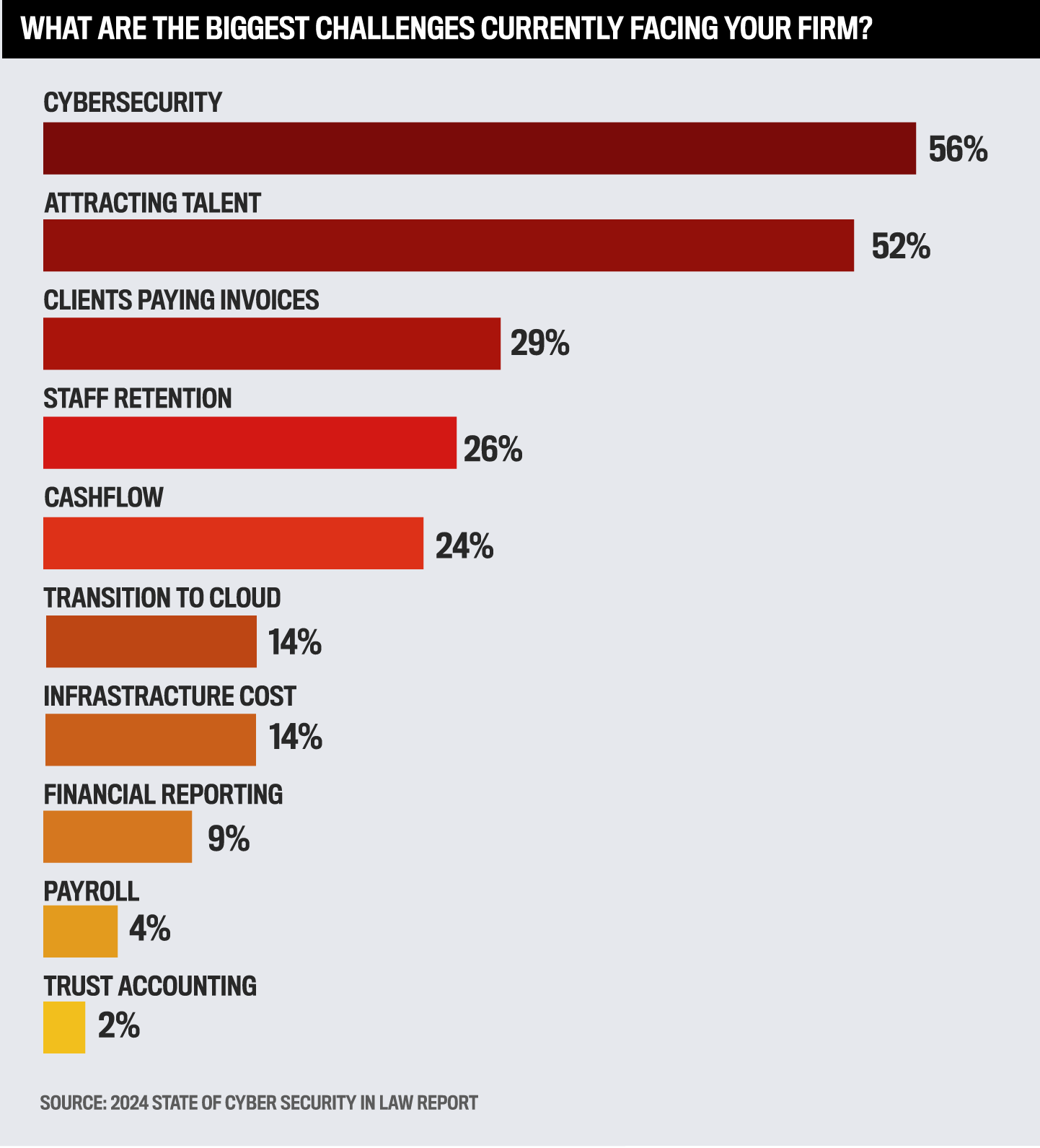
Other major issues that Australia’s influential law leaders have navigated include:
the increasing role of AI across various firm operations, including recruitment, performance evaluation and AI-based technology in performance management
the implementation of the Register of Foreign Ownership of Australian Assets on 1 July 2023, which imposes additional reporting obligations. Foreign persons are required to notify certain actions relating to Australian land, water, entities, businesses and other assets
the reduction in salary disparity between firms, with an average pay rise of 5% across most top-tier firms and increases as significant as 15-20% at national firms. Robert Walters Australia Legal Update 2024-2025 notes, “These salary adjustments are likely driven by national firms’ efforts to close the pay gap with international and top-tier firms, aiming to stem the domestic talent flow between competitors.”
In the corporate and commercial spheres over the last 12–18 months, there was a boost in demand in several practice areas, such as insolvency, structuring and restructuring, business acquisitions and disposals, as well as financing and refinancing.
In addition, there has also been the obligatory rise in AI’s adaptations.
“While there is no overarching regulation for the use of AI in New Zealand, all lawyers are ultimately responsible for the legal services they provide, "says New Zealand Law Society Chief Executive Katie Rusbatch. “Gen AI is rapidly emerging as a tool that opens exciting new opportunities for the provision of and access to legal services. However, there are also risks and ethical issues that need to be carefully managed for lawyers.”
The industry’s leaders have also had to contend with recruitment and retention of their top performers.
The ALPMA Legal and Recruitment NZ HR Issues & Salary Survey 2024 revealed:
average wages in the New Zealand legal industry saw a rise of 4.7%, marginally above the national average wage growth of 4.3% and matching inflation
56% of firms remain worried about their ability to attract staff in the coming year
47% of firms ready to boost remuneration packages by up to 10% to attract external talent, 14% prepared to offer increases of up to 20%
NZ recruitment agency Tyler Wren’s analysis on the legal industry in 2024 stated, “The need for employers to focus on establishing cultures that offer both work-life balance and a values-based approach to work will continue to rise within private practice, as it is these factors that are driving many lawyers in this space to look elsewhere.”
The pressing need for leaders to remain vigilant and provide positive working environments was further evidenced by a rise in legal professionals relocating driven by various factors, most notably salary expectations and improved work-life balance.
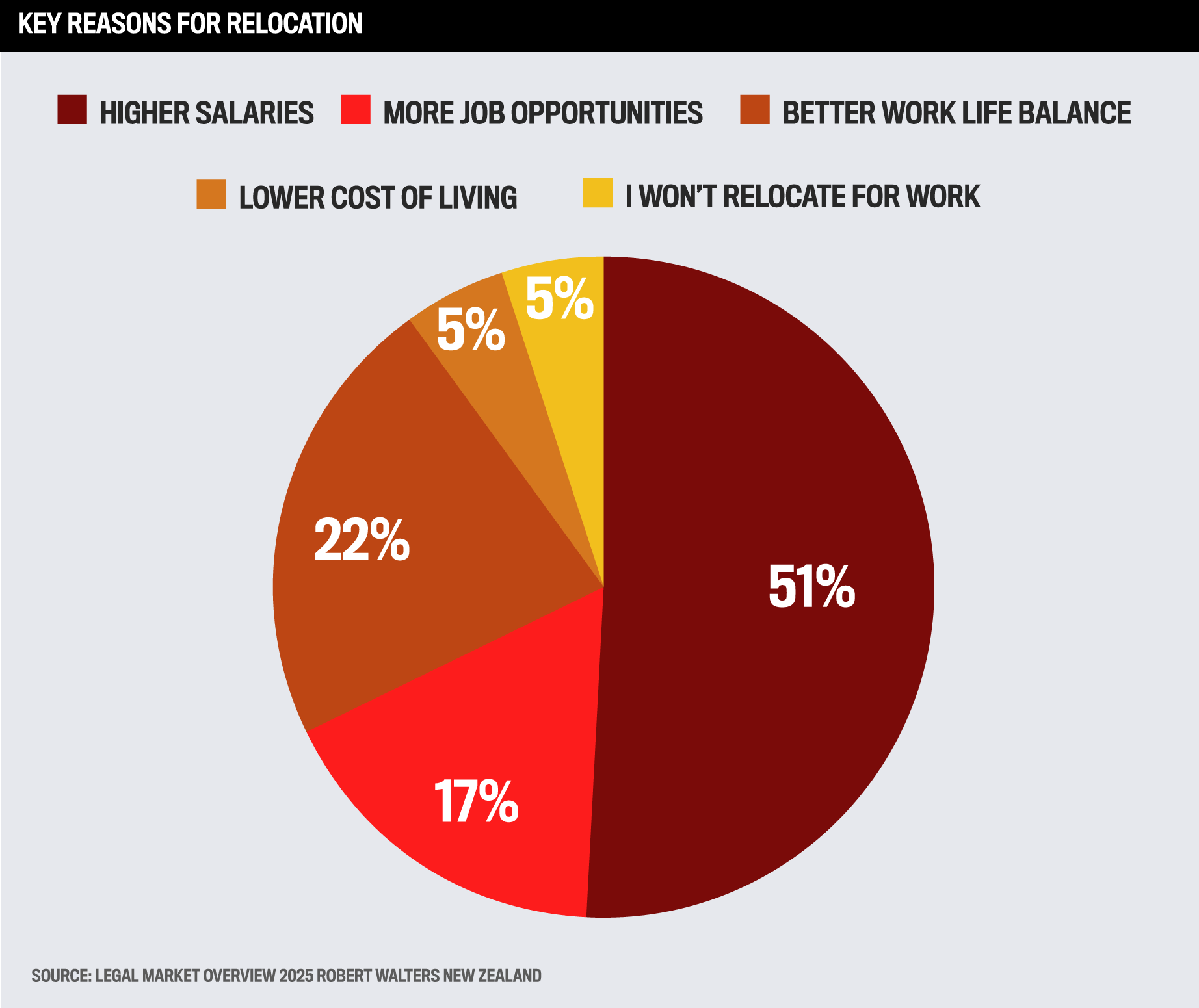
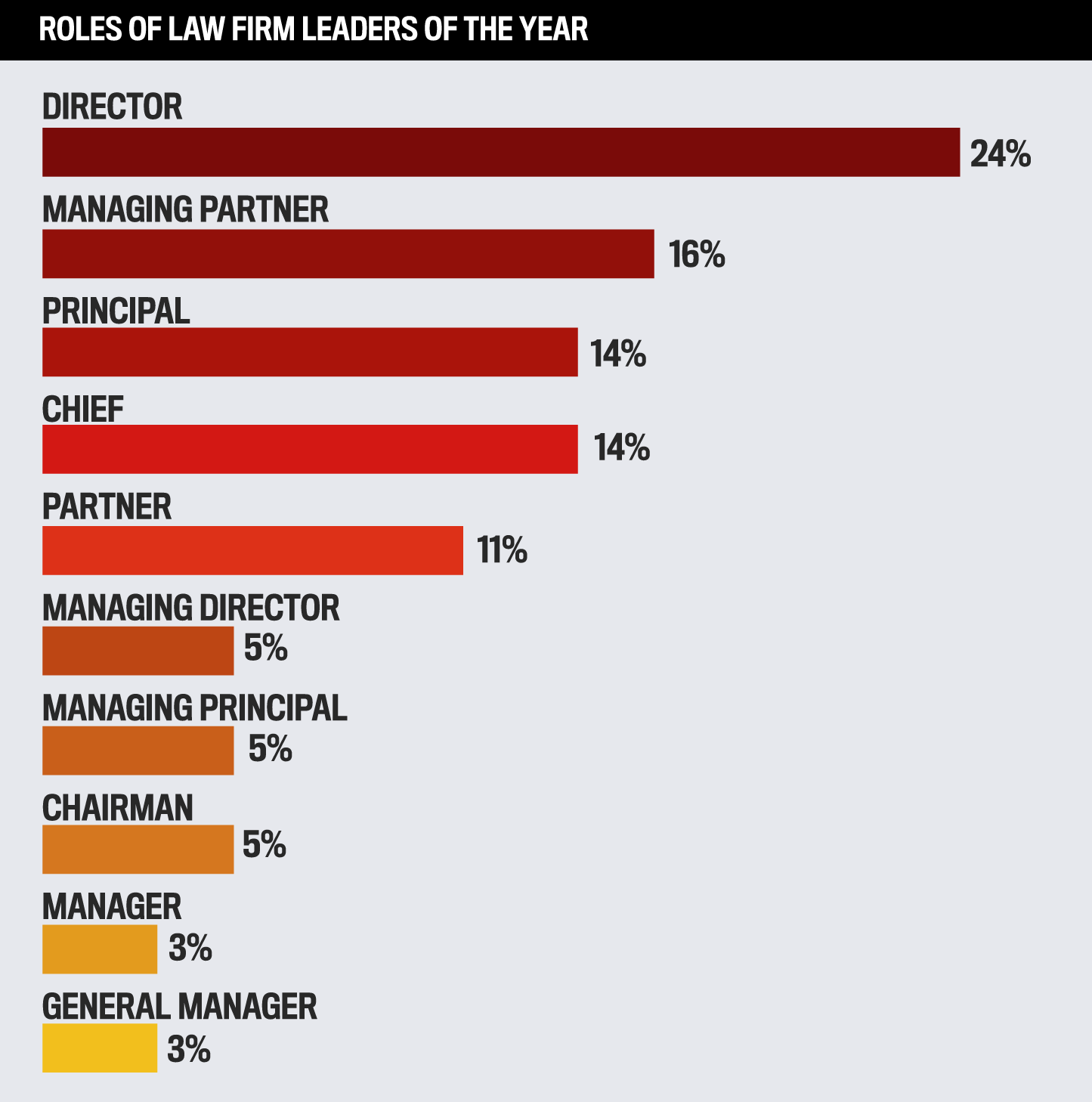
Founded the Wellington-based boutique employment law firm in 2021 after leading employment teams at large firms, Rieger advises national and multinational organisations, SMEs and individuals in senior leadership positions on all areas of employment law across New Zealand and Australia.
With a 137% revenue growth from 2022, resulting in the expansion of the team to 10 people, the firm has prospered since starting at a professionally fortunate time as the pandemic and resulting lockdowns took hold.


Rieger is a thought-leader, with organisations such as the Early Childhood Council, Crown Leadership International Group, Victoria University of Wellington Law Students’ Society, the Victoria University of Wellington Feminist Law Society and Umbrella Wellbeing enlisting her services to speak at webinars and conferences, on topics such as:
managing mental health
pay parity and funding
strategies for both employees and employers to recognise online and workplace bullying
disciplinary processes and employer obligations
creating inclusive environments
Since taking the helm in 2020 following the retirement of the firm’s founder, Zadow has driven things to new heights. Under his stewardship, fee revenue increased by 6.1%, while the commercial law practice, which he leads, has grown by over 18% by:
reinforcing and promoting a workplace culture where all team members contribute to ideas and strategies
establishing the technology committee, where interested team members are involved in identifying new tech and guiding the firm


Over the past 18 months, his work has ranged from business advice and agreements to enforcement and protection of business and intellectual property rights and complex estate planning for business owners and multi-generational families.
In addition to his overall responsibility for managing the firm, he shares legal expertise by writing articles and presenting webinars.
Since Papastergiadis’ tenure began in 2007, the firm has expanded from five partners to 29 and an increase in staff from 10 to over 200 strong.
Traditionally an insurance law firm, through his vision and leadership, it has diversified, now comprising 50% insurance practitioners and 50% of lawyers working over the full range of commercial areas such as:
corporate
property
construction
government
workplace and commercial litigation
Creating a culture of flexibility, camaraderie and excellence, while being involved in all hiring decisions, he is active in all policies impacting staff.


Papastergiadis’ hands-on management has resulted in significant organic growth in the last 18 months, driven by understanding the importance of diversity within the firm and is being active in ensuring the firm supports women. These efforts are evidenced by females comprising the majority of employees:
65% of all staff
59% of all legal staff
He is also passionate about supporting immigrant communities in Melbourne and is president of the Greek Community of Melbourne group and in 2019 was awarded the Order of Australia Medal (OAM) for his services to that community.
Making significant contributions to the legal sector in New South Wales over the past 18 months has been pivotal in shaping amendments, guidelines and regulations affecting the Compulsory Third Party (CTP) and workers’ compensation schemes.
As deputy chair of the NSW Law Society Injury Compensation Committee, Davidson has played a key role in critical industry discussions, including those at the Personal Injury Commission Stakeholder Reference Group.


At his firm, Davidson has shaped a business model that prioritises treatment, rehabilitation and care alongside securing exceptional compensation outcomes for clients. This approach involves close collaboration with injured clients and their treatment providers, ensuring that rehabilitation remains central to their compensation claims and that insurance companies adhere to approval and payment deadlines. His client-centric approach has not only driven the success of his firm but also ensured that clients receive comprehensive support throughout their recovery.
His deep understanding of the legal challenges surrounding cycling injuries, coupled with his commitment to enhancing road safety, has made him a key advocate for the cycling community, and was appointed to the board of Bicycle NSW in 2023.
Rieger negotiates a balancing act as leader of the firm but also a business owner. Part of her success has been empowering her team to succeed.
“We operate a high-trust model,” she says. “I always say, ‘I hire adults, so I’m not going to treat them like children’.”
Her leadership has been formed by working at various firms and witnessing a variety of styles.
She says, “I’ve really tried to pull the best parts of all the leaders that I’ve seen, and then when I reached what most people consider to be the pinnacle of the legal career of becoming a partner, I realised that actually for me, the most important thing was leading in a way that aligned with my value system.”
Reiger prides herself on instilling an “experimental culture,” which has seen the firm sign up for a year-long trial of AI software vLex.
“It is real interesting to be in that journey early, and I think we are early, especially for our size,” she says. “I know big firms globally are definitely looking in a lot more detail and leveraging it a lot more, but for our size and things, we're definitely one of the early adopters at this stage.”
Black Door Law also explores other areas that matter to its team, enabling them to better serve clients.
This is something Reiger places a focus on.
She says, “We’ve really leaned into that experimentation culture, looking at different ways of leveraging technology to make us more efficient. The other thing is we’ve focused a lot more on our internal learning, which isn’t all legal related. We do lunch and learns once a month, and one we did recently was Te Reo Maori, as the team really wanted to expand their understanding so we could better support a wider range of clients.”
Zadow instills a collaborative and collegiate ethos at Sharrock Pitman Legal.
“We’re still a relatively small firm. We have 27 people, and I still have a smaller client file load, so I try to be hands-on,” he says. “We are obviously hierarchical in the sense that we have principals and senior associates, but from a cultural point of view, it's very flat tiered.”
He adds, “When we have team meetings, brainstorming sessions and events or outings as a whole team, we don’t segregate into lawyers and assistants or senior lawyers and junior lawyers. Everyone is equal. Some of the best ideas have not come from me or the principals, but outside of that.”
Zadow believes it’s his role to foster an environment where everyone feels like they have an important role to play. This feeds into the firm’s bi-annual performance reviews.
He says, “We try to foster a really open communication culture, and I think that works. We don’t shut our doors and hive away into silos. People understand that it's a safe environment to make suggestions and give us feedback. We always reiterate, ‘This is a two-way street,’ and feedback both ways is not limited to once or twice a year in a review meeting.”
A priority that Zadow has encouraged is ensuring the firm remains ahead of the curve.
“Over the last year or so, there have been a lot of workplace relations law changes in Victoria – property tax and duty changes and proper government policy changes and things like that. It can feel like shifting sands, and things come through with very little fanfare, and people are none the wiser,” he says. “We see ourselves as not just being responsive to customers’ needs when they have an issue and they come to us, but also being proactive and getting in front of it all.”
In the same vein, all the firm’s lawyers are encouraged to write short, detailed bulletins and articles for social media to further educate clients on the impacts of changing legislation.
Zadow says, “It can be something quite broad, like wills and powers of attorney 101, or our most recent one was specific to petrol stations and leasing, property and franchise issues. It’s been a really good initiative because we've been able to present information to a group of people.”
Over the past 18 months, Papastergiadis has promoted eight new partners at Moray & Agnew Melbourne.
“It’s been exponential growth, both at a lateral level and internally,” he says. “We allow our lawyers and partners to feel like they are the masters of their own destiny. We look after our people, in other words, we empower them. We give them a lot of respect and allow them to develop their own practices, and we find that brings out the best in people.”
Papastergiadis is also the chairman of South Melbourne Football Club and borrows some of that sporting knowledge.
He says, “Leadership is a major part of any organisation, but that comes from the quality of the people that are around them. In football, you may have the best striker in the world, but if you’re not able to deliver the ball to them, then they will never score.
“There may be one of us that has the mantle of leader, but we are a team, and that binds us together. We've only had one partner leave for another firm in the last 15 years, most partners that have left have either gone in-house to a client or they have retired.”
Papastergiadis adds, “Once people work here, they enjoy the experience and realise that it’s a place where they can express themselves, become fulfilled and have a long career in a healthy manner.”
Delegating responsibility is important to Papastergiadis.
He says, “It’s critical for me to work with others who are better skilled than me in different areas. Whether it is HR or expressing a marketing or a strategy perspective, we work together to come up with the best solution. I am all for working with others to get the best outcome. It does not happen just through me; that is not my style.”
Part of Papastergiadis’ approach is to prepare for bumps in the road and to not allow them to disrupt the path he has set for the firm.
“You need to accept that there will be problems every day, but it’s important to be calm and measured through that process, and it’s important for us to work with others to help find that solution,” he says. “For us, feedback is constant.”
Under Davidson’s leadership, Advantage Legal has enjoyed a record 12 months as the personal injury firm has onboarded four new team members, bringing their headcount to nine, an almost 50% increase.
This has allowed Davidson to delegate. As the principal of a smaller firm, he is used to combining his file work with marketing, hiring and retention duties.
“I must admit, it was something that I thought I was going to struggle with, but it’s been a lot better than what I thought it would be,” he says. “It’s something that will continue to evolve over time, as I become familiar with the staff in terms of their own capabilities as they are trained on new things over time. I'm hoping that ability to delegate will actually snowball.”
Davidson continually looks for new ways to challenge the frameworks of traditional law.
He says, “If somebody says to me, ‘That’s the way it’s always been done,’ that for me is like a red flag to a bull. That means that it’s primed for doing it differently, as it’s probably lazy law and people not trying to be innovative. I’ve trained my staff here to ask, ‘Is there a better way? Can we be more efficient with technology? Can we do it more efficiently with relationships? Can we do it better with simply the communication that’s going on?’”
As part of that mindset, Davidson encourages lawyers to put themselves in the shoes of the client.
“There’s an old saying in law, ‘I didn’t have time to write a short letter, so I wrote a long one.’ We’re dealing with injured people who don’t understand legalese, so it’s about showing them you have complete control by putting it in plain language and understanding what they’re going through; that’s a real art form,” he says.
Davidson has also spearheaded technological advancements at the firm, streamlining and speeding up their processes.
He says, “At the beginning of 2024, we changed legal practice management software. It was a huge job, moving all our files over, changing workflows and training our staff, especially our new staff. There was also AI within it, so it was quite a big year for us.”
The Law Firm Leaders of 2025 helped their firms achieve strategic growth while contending with obstacles such as:
increasing cost of living
AI becoming a major player
evolving government regulation
client expectations increasing
In November 2024, the Supreme Court of NSW released Practice Note SC Gen 23, outlining guidelines for using generative AI (Gen AI) in legal proceedings. Chief Justice Andrew Bell highlighted potential risks with using Gen AI, such as hallucinations, and limits its use in drafting affidavits, written submissions and summaries of arguments, witness statements and expert reports.
The new guidelines will come into effect on 3 February 2025, coinciding with the new law term.
Davidson has responded to this and ensured Advantage Legal’s processes are robust.
“We’ve fixed all our systems so that Gen AI can be used internally and that it’s safe for all documents to ensure privacy and confidentiality, and everything is all locked down before rolling out those systems internally,” he says. “It’s been a huge undertaking for a small firm, but our staff and clients will see the benefits over the coming year.
“We see them as time-saving mechanisms. The risk is that they hallucinate, and things are inaccurate. We must have a process of checks and balances. The team has been upskilled, and we’ve got a Microsoft MVP consultant working with us to make sure that we’ve got a trusted advisor on all of this.”
For Zadow, the decision to leverage AI has been a key facet of his leadership. Sharrock Pitman Legal has experimented to see what works best for them and what products provide standout features.
He says, “Our attitude is not to put our head in the sand as it's here, and it will be helpful. It's not a substitute for using your brain, but it's a tool in the toolbox. I think the team appreciates that we are continually developing and refining our policies around it. When it first came out last year, the team appreciated that we didn’t put a ban on it, but we weren’t going to use it until we understood it.”
Embracing AI ties back to the internal culture of togetherness from top to bottom.
“They have enjoyed rolling up their sleeves and using it as a tool, whether it’s helping with explaining a legal concept or collating and summarising information,” Zadow says. “If they’re staring at a blank page, not knowing where to start, it can be used to put that skeleton together and then have a starting point. As for how we use it as a firm, we will figure that out together.”
Coming out of a post-COVID-19 world was tricky for Moray & Agnew.
“In Melbourne, the lockdown was among the most severe globally, which lasted up to two years with an inability to work within the office. It did fracture the culture of the firm in some ways,” says Papastergiadis. “But to our credit, the partners and their teams managed to stay connected, survive and thrive. However, we had no growth during that period because no one was leaving other firms.”
Another challenge for the firm has been making an impact in areas of law where there are more established names.
Papastergiadis says, “We ensure that that brand is accepted by clients and also by lawyers, because they want to work in a place where they feel they’re accepted.”
The domestic and global economy continues to pose a considerable challenge for Black Door Law.
“We’ve seen increasing costs across the board as we've had incredibly high inflation, which has impacted a number of our clients in terms of their affordability,” says Rieger. “We also need to support our team to live well as well as work well. So, there have been challenges in that space.”
Since 2021, the firm has tripled in size, and it’s been a battle to maintain their core values.
Rieger says, “We have employees who have been here since the early days, and the bigger you get, you've got to make sure you're keeping and protecting that culture. We haven't necessarily done that perfectly, especially in the last year when we've added extra members to the team.”
The way Rieger addressed that is through open communication.
“We had a reset conversation with the team, just figuring out what was going well and what wasn’t,” she says. “We took immediate action to remedy that, to ensure that everyone not only feels heard, but once they’ve been heard, they can see that there are changes happening from what they’ve said.”
Advantage Law’s growth over the past 18 months has brought fresh challenges.
“We were trying to bite off more than we could chew in terms of new clients and revamping our internal systems,” Davidson says . “When I hire, they could be the best person on paper, but if they don’t fit our culture, I won’t hire them. With the increase in hiring, it took longer to train them up, so I parked our ambitious internal objectives.”
Davidson cares about his staff, ensuring their growth doesn’t affect their wellbeing.
He says, “I don’t want them burning out; that’s more important than what we were trying to achieve internally. It came from having open and honest conversations with staff, learning about their workloads and capacities and what is going on in their personal lives and then acting accordingly.”
Papastergiadis cautions leaders to be cognisant that employees may be wary of opening up to senior colleagues and should foster an environment where people feel comfortable.
He says, “The closer your relationships are with those around you, the better the feedback you will get. There are a number of indicators, but the staff turnover rate is important. Profitability is also important because you need to make money to pay people well, but if there’s a revolving door, then you’ve got a problem.”
Rieger recently completed a 360-degree leadership assessment with an external company. It is a development tool that gathers feedback and data regarding a leader's performance from multiple sources, which is then evaluated against a set of skills and competencies.
“I don’t view it as criticism but as feedback on my leadership,” she says. “One of our firm values is around continual improvement, and if I’m not willing to listen, adapt and develop, then I’m not embodying the value that I set.”
Davidson instills a similar approach at his firm.
He says, “We have individual one-to-one development sessions with the team, and we’re looking for them to challenge the way we’re doing things. We don’t want them to answer, ‘You’re doing great; I’ve got nothing else to say.’ We want to know how to improve because we’re in uncharted waters as a law firm that’s trying to do things differently.
“Trying to learn through the process is one of the big things. If you keep an open mind with that, leading becomes a little bit easier because everything is for the benefit of your staff and clients.”
Australasian Lawyer and NZ Lawyer accepted nominations for the 2025 Law Firm Leaders of the Year list, inviting leaders to submit entries through an online form. The evaluation focused on their performance over the past 18 months, emphasising exceptional leadership, strategic vision, problem-solving and legal expertise, client satisfaction and contributions to their firm's success.
Nominations were assessed based on clear, evidence-backed achievements and measurable outcomes, along with plans for long-term impact.
After the review process, 28 leaders were recognised as the top law firm leaders in Australia and New Zealand for 2025.